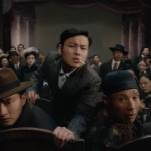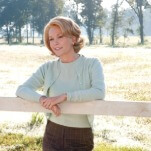There are few sweeter novels about barely repressed pedophilia than Melanie Benjamin’s new Victorian historical novel, Alice I Have Been. Whether that’s a good thing is likely up to individual readers, but large portions of the novel are far creepier than Benjamin probably intends them to be, and that makes the whole thing a bit of a puzzle.
The novel’s main problems stem from the fact that Benjamin tries to incorporate the entire length of Hargreaves’ life, from a rumored romance with a prince in her early 20s to her declining years, when she finally seemed to make peace with her literary legacy. The way the fictional Alice haunted Hargreaves her whole life is another interesting conceit for a novel. The children the classic Victorian fantasy tales were based on often found their lives so overshadowed by fiction that Hargreaves’ life full of tragedy seems almost mild compared to what, say, the boys who inspired Peter Pan went through. Benjamin fleetingly captures some of this melancholy, this sense of being eternally a child, even as the real-life child is forced to grow up, but she leans too heavily on mystery and obfuscation in the rest of the book.
It’s a historical fact that Hargreaves and Dodgson parted poorly when she was 11. The unclear reasons for this parting are fuel for a fun literary mystery. But Benjamin relies too much on this mystery. The mysterious events of that day drive the narrative to an absurd degree, to the point where characters who’d have no reason to care can think about nothing but what happened between young Alice and Dodgson. Thus, when the answer finally arrives in the novel’s denouement, there’s no way it can feel anything but disappointing.
The most troubling thing about all of this is that Benjamin never portrays Dodgson from anything approaching an objective point of view. This creates a mildly uncomfortable guessing game out of the central question of whether he’s repressing a deep-seated desire for young girls, or just sees something sad and wistful about youth and its eventual disappearance.
Alice I Have Been isn’t bad so much as bland, but that blandness creates a novel that gradually runs out of steam. The early portions, featuring Alice as a child, are shot through with verve and a sense of impending loss, but the book loses that verve as it turns into a generic Victorian romance. And that blandness becomes so all-encompassing that it drags down everyone—from famous authors to royalty—with it.








































